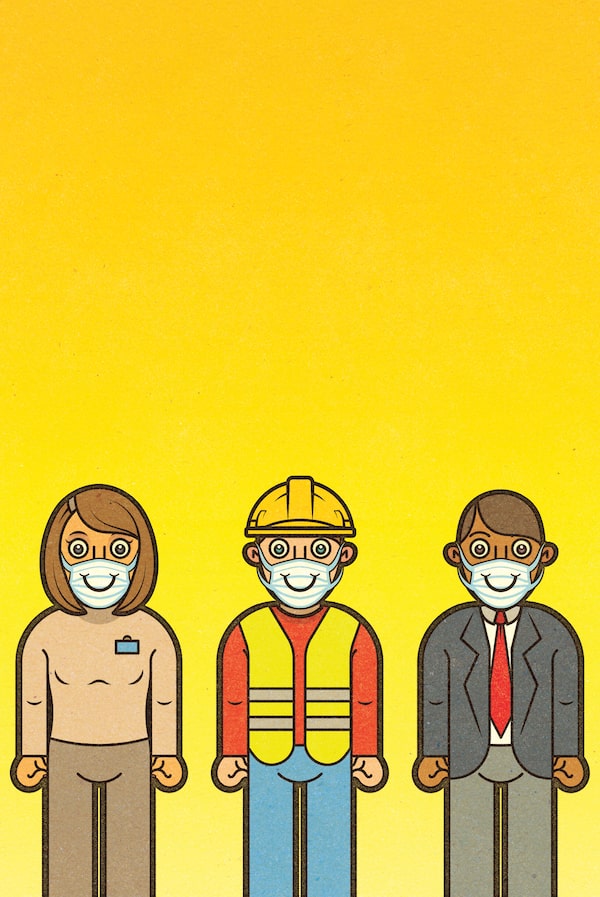
Alexei Vella/The Globe and Mail
Viral videos depicting maskless customers in heated exchanges with store clerks have become commonplace during the pandemic. Oleg Urminsky—a professor at the University of Chicago’s Booth School of Business—found himself in the opposite scenario last year when he visited a grocery store where the manager bagging groceries wasn’t wearing a mask. Urminsky, who describes himself as confrontation-averse, felt uncomfortable but didn’t make a scene; instead, he left and decided not to return.
If people who oppose mask mandates tend to be more vocal (and thus more viral) than those who support them, he wondered, how might that affect a firm’s likelihood of enforcing strict safety rules? And on the consumer side, how does a business’s handling of those rules affect people’s willingness to support the company? He co-authored a working paper with Abigail Bergman, a behavioural marketing researcher at the Booth School, running a series of experiments that tested how common backing for strict safety policies is among customers and managers. Across different types of businesses—big-box stores, hospitals and airlines—they found that a strong majority of people support stricter policies. But individuals also underestimate the percentage of other people who agree with the stronger rules. That’s a problem, the researchers argue, in the work to establish social norms that encourage companies to protect public health. The results are informative as we look toward a future when vaccination requirements for public spaces become a hot-button issue.
In one study, participants made a series of choices between an airline that required mask wearing and one that only recommended it. Prices varied between the choices, and respondents were also asked to predict other consumers’ preferences between two equally priced tickets. In 69% of cases, people selected the stricter airline—and were willing to pay a premium of about $27 for it. And people significantly underestimated how many others preferred the stricter airline. “The public sees the mask requirement as more controversial than it is,” the working paper reads.
In another study, participants watched two real-life videos recorded in different Walmart outlets. In one video, a maskless customer was confronted by a manager and removed from the store; in the other, customers complained about a mask-free patron, but no action was taken by management. They were then asked to choose which store they would rather visit. About 70% of people chose the stricter Walmart. The store staff was also rated significantly higher on showing traits like warmth, care and competence. But yet again, participants underestimated the percentage of others who would choose the first option.
To sustain a norm like mask wearing, the researchers argue, people must not only support the idea but believe others support it as well. The theory relates to a social science concept known as pluralistic ignorance: when those in a majority group privately disagree with something but go along with it because they incorrectly assume most others accept it. This widely studied phenomenon has been implicated in issues from college alcohol consumption to discouraging female participation in the labour force. In the context of mask wearing, if you support strict enforcement rules but don’t know you’re in the majority, you might be less likely to speak up about it. And if you’re a manager, you may not align your firm’s policies with your beliefs. In the current study, 88% of managers thought everyone should wear a mask indoors, but just like consumers, they strongly underestimated support for those requirements among customers.
Even as vaccination numbers rise and mask mandates are loosened, companies will need to make decisions about which safety rules to keep. Some are already having to decide whether to make vaccines mandatory for their employees. And if the norm skews toward anti-mask (or anti-vaccine) perception despite popular approval, there may be hidden costs for businesses whose policies are lax because they fear a backlash. “Going forward, signs of active cleanliness are probably going to be seen as more positive than before the pandemic,” added Bergman. Furthermore, the study respondents in most cases rated stricter stores as warmer and more competent—the former rating was particularly surprising for the researchers.
The paper’s final study asked participants to choose between a hospital that requires employees to be vaccinated and one that doesn’t. They found the same pattern of widespread support for a stricter policy alongside underestimation of that opinion in others.
They also found that the more an individual underestimates wider support for a vaccine-enforcing hospital, the less likely they are to warn a friend away from visiting the less strict facility. That result again points to the difficulty of establishing social norms that help businesses weigh the costs and benefits of their policies. “We don’t have well-established norms that there’s consensus about, so people are kind of guessing. If we know what the norm is, we know when to complain and not to complain, when to give advice and not to. Our evidence suggests that people’s inaccurate beliefs about these norms get in the way of building social consensus about what firms should do,” says Urminsky.
But the researchers warn business owners not to interpret their findings as unconditional—especially in a hotbed of anti-mask or anti-vaccine sentiment. “An overinterpretation of our results would be, for example, making a big show of throwing a maskless customer out of a store and posting it online,” says Urminsky. “There may be backlash against strict enforcement that we didn’t measure.” Still, as public health mandates evolve and firms balance safety rules against the risk of alienating their customers, it seems that enforcing strict safety policies will only serve to bolster support among most customers—no matter how vocal the dissenting minority.
Your time is valuable. Have the Top Business Headlines newsletter conveniently delivered to your inbox in the morning or evening. Sign up today.